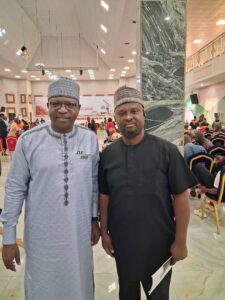
Hon. Mamman Nda Eri, the National Chairman of the Forum of State Independent Electoral Commissions of Nigeria (FOSIECON), has called on the
The National Assembly to reject the proposed National Local Government Electoral Commission, (NALGEC) through constitutional amendment.
 The FOSIECON Chairman said rather than the establishment of NALGEC, the constitutional amendments should be one that will improve the functionality and credibility of SIECs.
The FOSIECON Chairman said rather than the establishment of NALGEC, the constitutional amendments should be one that will improve the functionality and credibility of SIECs.
Hon. Eri made the disclosure at a presentation to the Senate Joint Committee on Constitutional Review held in Jos, Plateau State Capital, for the Northern States.
In his presentation titled: preserving Nigeria’s Federal Structure; The Case Against a National Local Government Electoral Commission (NALGEC), maintained that rather than NALGEC, called for the Strengthen of State Independent Electoral Commissions (SIECs)
The FOSIECON Chairman called for amendment to Sections 197 and 199 of the Constitution to strengthen the independence and functionality of State Independent Electoral Commissions in the country.
He called for a mandate to have uniform minimum standards for local government elections through a model electoral framework developed collaboratively by INEC and the SIECs.
Furthermore, the FOSIECON Chairman, advocated the
Promotion of capacity building and professional development within SIECs, added that it funding should be done through a dedicated state electoral support grant scheme.
Hon. Eri pointed out that the credibility of local government elections in the country
remains crucial to the nation’s democratic development said;
“The solution to having credible elections in the Local Government is not in the centralization of power, but the reformation and empowerment of existing state institutions”.
The FOSIECON Chairman equally called for the upholding of the principles of federalism, deepen democracy at the grassroots, as well as deliver constitutional reforms that respect the structure of Country.
Hon. Eri said establishing a National Local Government Electoral Commission (NALGEC), adding that the proposal is misguided and will be counterproductive to Nigeria’s federal democratic structure.
“Rather than create another central electoral body, the constitutional reform effort should focus on strengthening the State Independent Electoral Commissions (SIECs) to make them more credible, autonomous, and accountable”.
On Federalism and constitutional consistency, Hon. Eri explained that Nigeria operates a federal constitution, which clearly delineates responsibilities among the federal, state, and local governments.
adding that Section 7 of the 1999 Constitution guarantees the democratic existence of local government councils under state jurisdiction.
He noted that the establishment of NALGEC will introduce federal overreach into a constitutionally defined state function, thereby eroding state autonomy and violating the spirit of federalism.
He further noted that Nigeria already has an independent central body—INEC—charged with national and state elections, said establishing NALGEC will introduce bureaucratic duplication and unnecessary overlap.
Establishing NALGEC, Hon. Eri said it will require
Infrastructure in all 774 LGAs, Recruitment, training, and deployment of election personnel, added that having another funding structure, will increase cost without solving the underlying issues.
The FOSIECON Chairman stressed that the strongest arguments against SIECs is that they are often partisan and beholden to state executives, he however said replacing them with a federally-controlled body merely relocates the political influence from the state level to the federal level, potentially worsening the situation.
He said electoral credibility cannot be achieved through centralization but through decentralization with accountability, opined
that amending the Constitution to create NALGEC would require overhauling several sections, including Sections 7, 153, 197–204, and the Third Schedule.
The Chairman said the amendment of the constitution to include NALGEC may create legal ambiguities and generate resistance from state actors, thereby disrupting the local democratic structure.
Hon. Eri said rather than abolish SEIC, recommended Strengthening them, urge the National Assembly to initiate reforms that addresses the root causes of their weaknesses.
He said to guarantee the Independence of SIEC, recommended securing the tenure of SIEC commissioners, transparent appointment process with state legislative confirmation as well establish a fixed tenure with removal only through due process.
On Financial Autonomy, Hon. Eri said SIECs recommended that financing that places it first-line charge funding from the state consolidated revenue funds.
Other recommendations the FOSIECON Chairman made include, auditing SIECs financial reports to promote transparency and accountability.
He also recommended standardization and Collaboration to support SIECs through technical assistance, standard setting, and inter-agency cooperation.
The Chairman concluded his presentation by advocating
Legislative Oversight, Mandate periodic reporting to state Houses of Assembly and empower civil society to engage in oversight of SIEC activities.
